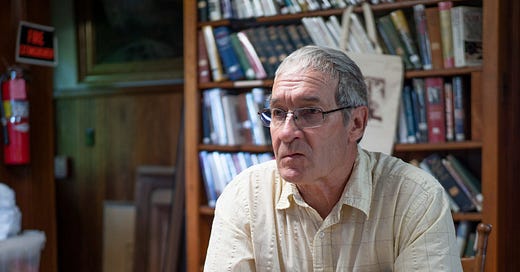FINNS: An Oral History - "Black-haired Someros and the Titanic"
Becoming Americans - Earl Somero and Patricia (Barney) Hoard
FINNS: An Oral History of Finnish-Americans in New Hampshire’s Monadnock Region
Excerpted from FINNS: An Oral History... by Patricia Kangas Ktistes, 1997, all rights reserved.
Becoming Americans - Interviews
Earl Somero
I speak some Finnish, but not a whole lot. Just enough to be dangerous. Once my brother Ray and his wife Miriam had some of her relatives visiting from Finland. And in English, they asked me how I was. I answered them with a few Finnish words and I guess my accent sounded so good that they thought I knew the language. Right away they got excited and rattled off a bunch of Finn. Well, needless to say, I caught the first few words and then was lost.
But the latest theory on the migration of the Someros is this: are we really Finns or are we not? My niece, who teaches at Northern Michigan University, knows a history professor who has a theory that during the Spanish Inquisition there were a number of Spaniards who migrated to the north. Supposedly, some went to Finland and settled there. They brought the name Somero with them: there is a corresponding place in Spain. Even though we may think we’re Finns, somewhere in our ancestry there could be Spanish. And yes that could explain where all those black-haired Someros came from.
Patricia (Barney) Hoard
I was reading my mother’s family tree. She was one of 13. The reason my grandfather had 13 children: he had nine with his first wife and she died of peritonitis. About three years after his first wife died, he married Aili, a wonderful, incredible woman. But eight years after the wedding, she got sick. She’d had three children already, but she had a vision. She was a great, Godly woman. Her vision was of her and my grandfather walking together with four children. And she said, “We will have a fourth before I go.” My grandfather was horrified. He was old and had a dying wife and 12 other children. But Aili gave birth and lived two more years.
Then my mother’s father married Hilda, a 50-year-old woman who never married. The best story we have about her is that when she was 18 she wanted to come to America and knew no English. She made her way to England and was in line so she could get on the boat and she was crying; she was leaving all of her family. She was traveling alone and had very red eyes and they said, “You have an eye disease.” She was trying to say, “No, please, I’ve just been crying.” They pushed her aside and said, “No. You can’t go on.” And the boat that she was trying so desperately to get on was the Titanic.
My paternal grandmother married three times. She married Jakob Riiski, they had four children, and Jakob died. She married Bergstedt and her children were adopted by him, so our family name changed. Bergstedt died and she married Wiljanen. She was in a nursing home because she was senile around age 90. She never recognized any of us. But if you’d get somebody who could speak Swedish—especially about religion—or sing an old song, she was right there. Romans 8:28 says:
For I am convinced that neither death nor life, neither angels nor demons, neither the present nor the future, nor any powers, neither height nor depth, nor anything in all creation will be able to separate us from the love of God that is in Christ Jesus our Lord,
And I know it’s true. My mother’s grandmother couldn’t recognize her own children, but she would have these very intellectual, Godly conversations with people who could speak in either Finnish or Swedish. In English, it didn’t matter: she wasn’t there.




My father had black hair and grey eyes. My uncle was blond with sky blue eyes. Finland was in the middle of countries that were always fighting and Finland was trying be neutral when it wasn't being controlled by either Russia or Sweden. There was a lot of population movement. The language has some hints of Hungarian. The Lapps due to where they lived, had physical traits suited to that environment. So there is no one type of Finn. On the name Somero,, I remember in 1960 Linda Somero saying to someone (as a joke) that she was Linda SO Mero rather than SOM Ro as we usually pronounced it. Maybe it really was SO Mero at one time. :)